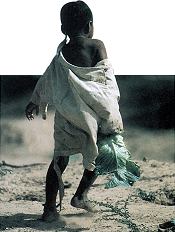 Like the boy in this photograph, many children don't have shoes to
protect their feet from the hard rocky ground, beds to sleep in at night,
or enough food to eat. Parents try to give their children what they need,
but they don't always succeed. Sometimes wars separate families, and
sometimes droughts or other natural disasters make it impossible to
grow crops or raise cattle.
Like the boy in this photograph, many children don't have shoes to
protect their feet from the hard rocky ground, beds to sleep in at night,
or enough food to eat. Parents try to give their children what they need,
but they don't always succeed. Sometimes wars separate families, and
sometimes droughts or other natural disasters make it impossible to
grow crops or raise cattle.
Why do you think our tradition teaches that it is our
responsibility to help such people?
|
God doesn't create loaves of bread. God provides resources
such as seeds, soil, air, sunshine, and rain, from which
wheat can grow. People do their part by planting the
seeds, harvesting the wheat, grinding it into flour, and
preparing and baking the dough. In addition, Judaism
teaches that it is our responsibility to make sure God's
resources are used to benefit everyone.
Not only are we required to share a portion of our food
with those who are hungry, it is also our duty to help
them grow their own. That is why it is a mitzvah to work
with others to irrigate land in countries suffering from
drought, and to teach developing nations how to renew
soil and protect crops from insects and disease.
Without
the Bible and Talmud there would be no instructions for
tikkun olam. Without community we would have no
one to work with to make our dream of a better world
come true.
|
REPAIRING AND IMPROVING THE WORLD
Our sages taught that people were created to enjoy and
care for the world. We study the wisdom of the Torah,
Prophets, and Talmud to learn how to repair damage when
it occurs. By doing our share, we participate in a very
important part of Jewish life called tikkun
olam--repairing the world.
|
 Like the boy in this photograph, many children don't have shoes to
protect their feet from the hard rocky ground, beds to sleep in at night,
or enough food to eat. Parents try to give their children what they need,
but they don't always succeed. Sometimes wars separate families, and
sometimes droughts or other natural disasters make it impossible to
grow crops or raise cattle.
Like the boy in this photograph, many children don't have shoes to
protect their feet from the hard rocky ground, beds to sleep in at night,
or enough food to eat. Parents try to give their children what they need,
but they don't always succeed. Sometimes wars separate families, and
sometimes droughts or other natural disasters make it impossible to
grow crops or raise cattle.